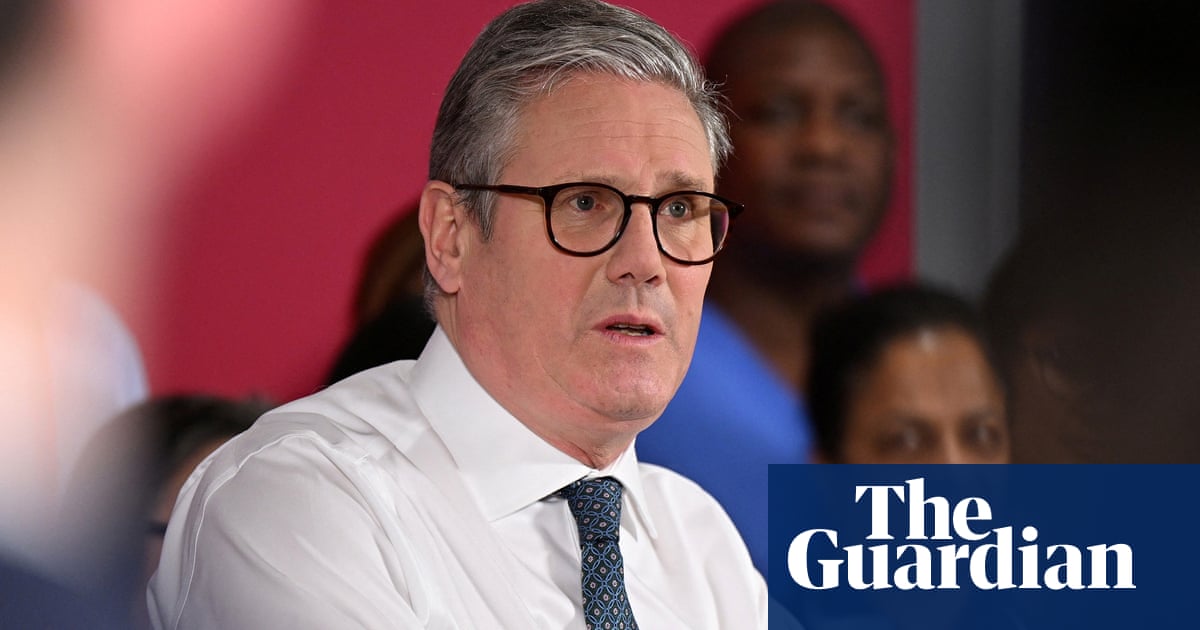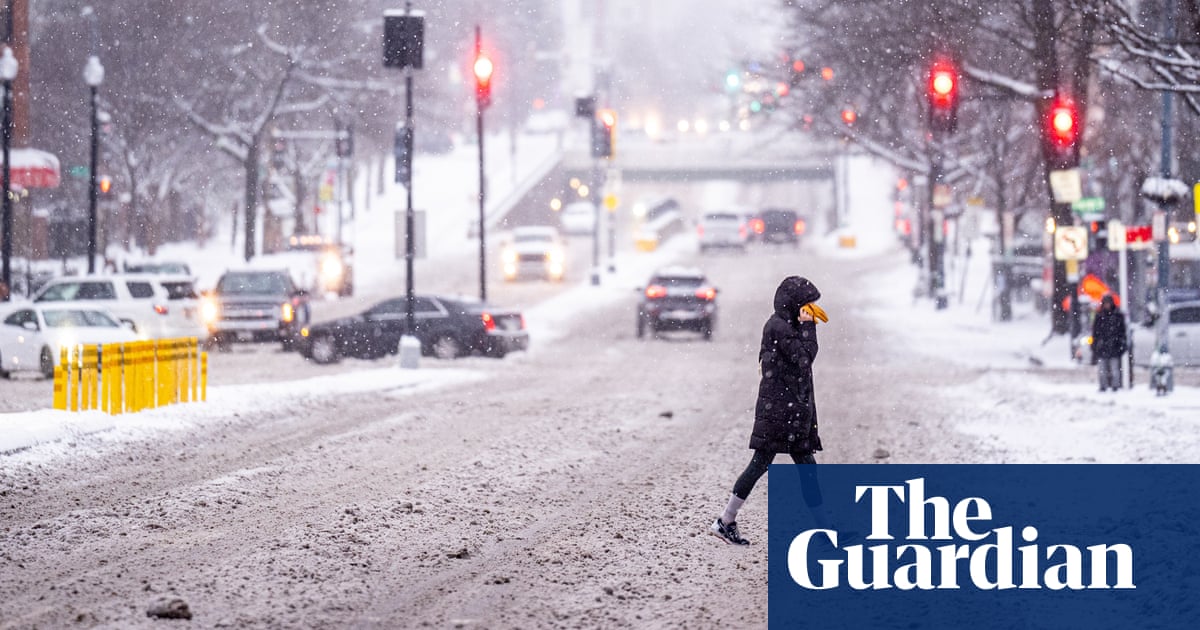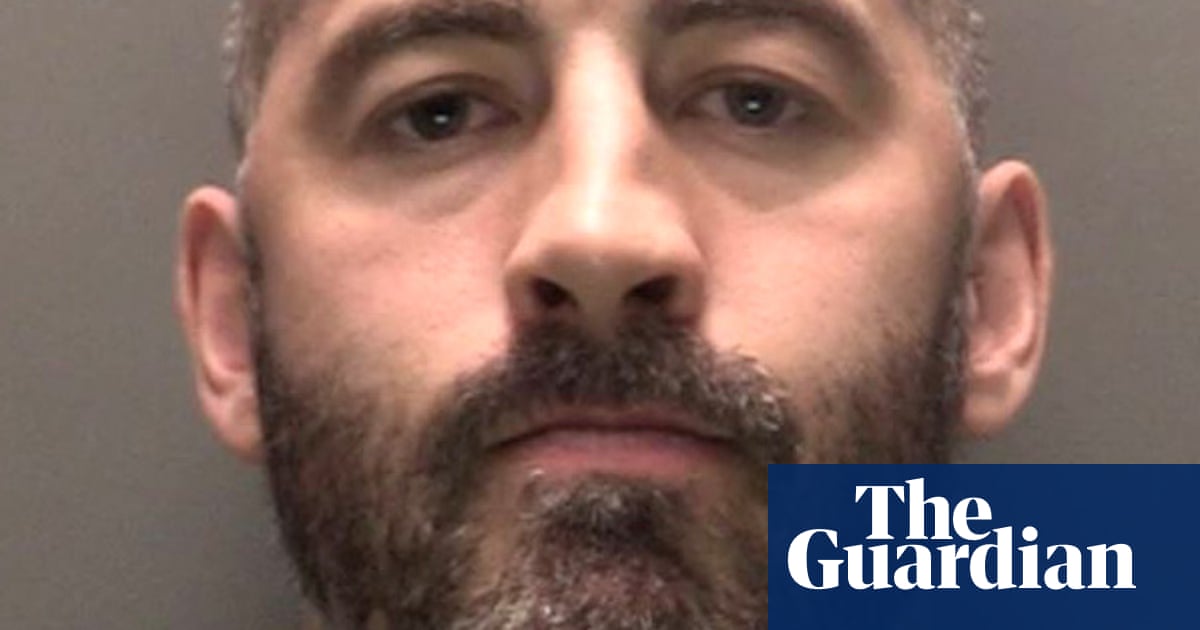Spain's prime minister makes televised statement
Pedro Sánchez has just addressed the nation. My colleague Sam Jones has this dispatch from Madrid:
In a televised statement on Wednesday morning, Sánchez, called for unity, solidarity - and vigilance.
“We mustn’t let our guard down because the weather front is still wreaking havoc and we can’t say that this devastating episode is over,” he said.
“There are still weather warnings in Andalucía, Valencia, Aragón, Castilla y León, in Cataluña, in Extremadura, in Navarra, in La Rioja and in Ceuta. That’s why I’m asking people in those areas to take special care: to stay off the roads; to avoid travelling close to ravines, riverbanks and riverbeds, and to heed the advice of the emergency services and of the police. No one should be putting their life at risk.”
The prime minister said that Spain had had more than its fair share of natural and health emergencies in recent years - mentioning the Covid pandemic, Storm Filomena in January 2021, and the volcanic eruptions in the Canary Islands that same year - but said such adversity brought out the best in the country.
“We’re going to lend a hand and help those who can’t get into their homes or who are looking for relatives or friends or loved ones,” he added. “But most of all, right now, we’re going to stand with those who are suffering the loss of their loved ones.”
Key events Show key events only Please turn on JavaScript to use this feature
The mayor of the small town of Utiel, in the Valencia region, has said emergency services were still scrambling to track down several people who are missing in his town.
“Yesterday was the worst day of my life,” Ricardo Gabaldón told national broadcaster RTVE.
He added:
We were trapped like rats. Cars and trash containers were flowing down the streets. The water was rising to three meters.”

Ajit Niranjan
Climate scientists have warned that torrential rains are set to get stronger as the planet heats up.
Ernesto Rodríguez Camino, senior state meteorologist and member of Spanish Meteorological Association, said: “These types of intense and exceptional, rare rainfall events are going to become more frequent and more intense and, therefore, destructive.”
He said scientists would be able to quantify the role of climate change after the event but could not do so on the fly.
María José Sanz, scientific director of the BC3 Basque Centre for Climate Change, said hotter oceans meant there was more water in the atmosphere. Changes in the jet stream also appear to be keeping areas of low pressure in one place for longer.
The air can hold 7% more water for every degree celsius the planet heats. The world has heated about 1.3C and Europe has warmed by about double that.
Liz Stephens, a climate risk scientist at the University of Reading, said “the tragic consequences of this event show that we have a long way to go to prepare.”
A red weather warning was issued for the region with enough time for people to move out of harm’s way, she added, but a red warning alone doesn’t communicate what the impact will be or what people should do.
“People shouldn’t be dying from these kinds of forecasted weather events in countries where they have the resources to do better.”
The EU has offered support to Spain, the president of the EU Commission has said.
In a post on social media, Ursula von der Leyen said “Europe is ready to help.”
What we're seeing in Spain is devastating.
My thoughts are with the victims, their families and the rescue teams.
The EU has already offered support.
Copernicus has been activated.
The #EUCivilProtection can be mobilised.
Europa está lista para ayudar https://t.co/SOsCIxHwvV
Death toll in Valencia region rises to 63 people
At least 62 people have died as a result of the floods, regional authorities in Valencia have said.
The central government delegation in the central Castilla-La Mancha region later said an 88-year-old woman was found dead in the city of Cuenca.
Speaking to reporters in the Canary Islands, Spain’s King Felipe has spoke of the “enormous destruction” caused by the floods.
There are still difficulties when it comes to accessing some areas, so we do not have complete information on the extent and possible victims.
"I am comforted by the knowledge that all possible means available are at the disposal of the authorities and emergency services. They are all working and the important thing is to let them work in a coordinated manner”.
Spain's prime minister makes televised statement
Pedro Sánchez has just addressed the nation. My colleague Sam Jones has this dispatch from Madrid:
In a televised statement on Wednesday morning, Sánchez, called for unity, solidarity - and vigilance.
“We mustn’t let our guard down because the weather front is still wreaking havoc and we can’t say that this devastating episode is over,” he said.
“There are still weather warnings in Andalucía, Valencia, Aragón, Castilla y León, in Cataluña, in Extremadura, in Navarra, in La Rioja and in Ceuta. That’s why I’m asking people in those areas to take special care: to stay off the roads; to avoid travelling close to ravines, riverbanks and riverbeds, and to heed the advice of the emergency services and of the police. No one should be putting their life at risk.”
The prime minister said that Spain had had more than its fair share of natural and health emergencies in recent years - mentioning the Covid pandemic, Storm Filomena in January 2021, and the volcanic eruptions in the Canary Islands that same year - but said such adversity brought out the best in the country.
“We’re going to lend a hand and help those who can’t get into their homes or who are looking for relatives or friends or loved ones,” he added. “But most of all, right now, we’re going to stand with those who are suffering the loss of their loved ones.”
The German government has offered its help to Madrid, a spokesperson in Berlin said on Wednesday.
“We are in direct contact with the Spanish government as to whether there should be support from Germany for this terrible disaster,” the spokesperson said, according to Reuters.
The floods in Spain come some three years after the 2021 floods that killed more than 220 people in Europe, leaving a trail of destruction in Germany and Belgium, as well as damage in the Netherlands, Austria and Switzerland.
Speaking earlier on Wednesday, Spain’s prime minister, Pedro Sánchez, expressed his condolences to the families of the at least 52 people who have died and others who continue to search for their missing loved ones.
“We are going to help you with all the resources of the State. And if necessary from the European Union”, he said.
He added:
“I would like to ask citizens not to let our guard down. The storm continues to wreak havoc.”
Valencia CF pledges to help in 'any way possible'
Valencia’s football club have expressed their “sincere condolences” to those who have died, adding in a social media post that it was ready to help authorities in “any way possible”.
They have also postponed their Copy Del Rey clash with Parla Escuela, which was due to take place this evening in Madrid
Valencia CF would like to send its sincere condolences to the families and friends of those who died as a result of the #DANA.
Much strength to all the neighbors and affected populations and to the groups that are working on the prevention and consequences of the effects of the… pic.twitter.com/d6gi5t2zUh
Spain floods: What we know so far
-
At least 52 people have died after torrential rains hit southern and eastern Spain on Tuesday, bringing flash floods that raged through towns and cut off roads and rail lines.
-
Emergency services in the eastern region of Valencia have confirmed the deaths of 51 people though the region’s leader said it was still too early to provide a comprehensive death toll. The central government office for Castilla La Mancha region said an 88-year-old woman had been found dead in the city of Cuenca.
-
In some parts of the country, more than a month’s worth of rain fell in a day, leaving dozens of people stranded, with some reportedly forced to climb on top of cars or gas stations as they waited to be rescued.
-
The country’s prime minister, Pedro Sánchez, was expected to speak on Wednesday just before midday. Soon after, he is expected to chair a crisis meeting on the floods.
-
The intense rain has been attributed to the gota fría, or “cold drop”, which occurs when cold air moves over the warm waters of the Mediterranean Sea. This creates atmospheric instability, causing warm, saturated air to rise rapidly, leading to the formation of towering cumulonimbus clouds in a matter of hours and dumping heavy rain across eastern parts of Spain.
Rescues as torrential rain brings flash flooding to Spain – video
Some photos taken after the storm dropped a year’s worth of rain in hours, causing rivers to quickly burst their banks and even spawning tornadoes

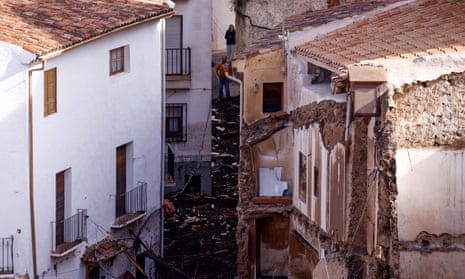
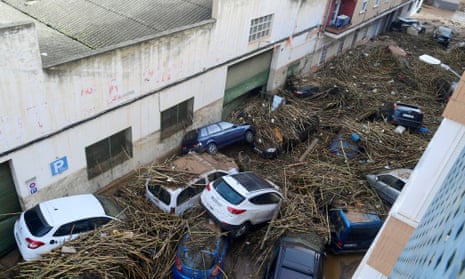
Spain's King Felipe sends 'strength and encouragement' to flood victims
Spain’s King Felipe has said he was “heartbroken” by news of the floods, in a social media post that offered condolences to the families of the more than 50 people killed.
“I’m sending strength, encouragement and all the necessary support to all those affected,” he said. “We recognise and appreciate all the local and regional authorities and the emergency and security services as they continue with the titanic task they have been carrying out since the very first moment.”
Desolados ante las últimas noticias sobre la DANA. Nuestro más sentido pésame a los familiares y allegados de los más de 50 fallecidos.
Fuerza, ánimo y todo el apoyo necesario para todos los afectados.
Nuestro mensaje más cercano y reconocimiento a autoridades locales y…
Dozens of people spent the night stranded as mud-coloured waters rose across huge swathes of Spain, from the southern provinces of Malaga to the Valencia area in the east.
Some perched on top of cars and trucks, hoping to be rescued, while others climbed onto the rooftops of shops and gas stations, newspaper El Paīs reported. Rescues took place throughout the evening and continue Wednesday.
More than 50 feared dead after flash floods in Spain
Sam Jones
At least 51 people are feared to have died after torrential rains hit southern and eastern Spain on Tuesday, bringing flash floods that raged through towns and cut off roads and rail lines.
As the search continued for the missing, people were urged to stay off the roads amid warnings that the number of fatalities could rise.
Speaking on Wednesday morning, the president of the eastern region of Valencia said it was still too early to provide a comprehensive death toll.

.png) 2 months ago
17
2 months ago
17








